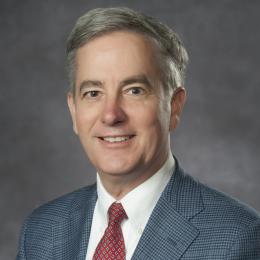
Restoring Movement for Our Heroes and Our Community
At the end of World War II, more than 100,000 of our nation’s heroes returned home in need of care from the Veterans Health Administration. To meet the demand, VA medical centers began partnering with medical schools throughout the country to care for veterans and to train young clinicians.
Seventy years later, VCU Health and the Hunter Holmes McGuire VA Medical Center maintain an exceptionally strong partnership that fosters world-class care for our heroes and community, promotes the research that makes that care possible, and provides the education to ensure that care continues to advance and evolve.
This story is one of many that highlights people who are changing lives in Richmond and beyond through the VCU-VA partnership.
Kathryn Holloway, M.D., is an electrician who specializes in what has been called the most complicated object in the known universe – the human brain. She is a professor in the Department of Neurosurgery at VCU School of Medicine and neurosurgical director of the McGuire VAMC Parkinson’s Disease Research, Education and Clinical Center.
Her sub-specialty? The “off switch,” which, despite what the term may suggest, actually restores in her patients the ability to move more normally, helping them do everything from drink a cup of coffee to walk.
“In order for the off switch to work, you need to understand the brain circuit you’re trying to put it in,” she told us recently at an MCVF Board of Trustees meeting.
Dr. Holloway’s circuit of interest is the basal ganglia, a group of subcortical nuclei in the human brain associated with, among other things, voluntary motor movements. Those who suffer from Parkinson’s disease, a chronic and progressive movement disorder that causes tremors, slow movement, stiffness and impaired balance, lose a part of the basal ganglia. Losing that component of the brain makes the brakes of the motor system overactive. In turn, the overactive brakes begin to shut down the accelerator of the motor system.
By turning off some of the overactive areas — a procedure known as deep brain stimulation — motor function can be restored.
Holloway’s team sees an 80 percent reduction in tremor and dyskinesia (extra movements caused by the Parkinson’s medications) and a 40 to 60 percent improvement in walking, slowness and stiffness – they achieve that level of improvement in 80 to 90 percent of the patients they implant.
“This allows patients to return to activities that they had to give up due to the Parkinson’s, which can be as basic as walking or feeding themselves, or as complex as riding a bicycle or painting,” Holloway said. “The most important thing we provide is more years of enjoyable living.”
MCV Foundation trustee Charles Bryan Jr., PhD. — someone who knows first-hand about those extra fulfilling years — introduced Dr. Holloway when she spoke at our recent meeting.
“Thirteen years ago, I was diagnosed with Parkinson’s, and last year I had the privilege of having my brain operated on by one of my real heroines, Kathryn Holloway,” he said. “The VA-VCU collaboration is something we need to pay more attention to. If you go out to McGuire you will see medical students, interns and residents who are an important part of the process there. They learn and benefit, the veterans benefit, and so does VCU.”
Deep brain stimulation began at VCU Medical Center in 1997 shortly after it was approved by the Food and Drug Administration, and two years later Dr. Holloway expanded the program to begin performing the procedure at McGuire VAMC. To date, between VCU Health and McGuire VAMC, Holloway’s team has performed close to 600 deep brain stimulation procedures and the partnership has led to new technology development and landmark research. McGuire VAMC serves the entire southeast portion of the U.S. and provides care to veterans throughout the East Coast.
“Everything we learn from treating patients at VCU can be translated to the VA and vice versa,” Holloway said. “This accelerates the discovery process and innovations in care. The big data generated from our combined university and VA studies have changed the practice of medicine. It allows us to make the most of the research resources at each facility instead of duplicating them at each institution.”
In addition to Parkinson’s disease, Dr. Holloway and her team use deep brain stimulation to treat essential tremor and dystonia, a movement disorder in which a person's muscles contract uncontrollably, causing the affected body part to twist involuntarily and create abnormal postures.
Researchers continue to find new ways to use deep brain stimulation. It’s being investigated as a treatment of depression, dementia, obesity and epilepsy.
In addition, experts from the deep brain stimulation team are working with experts in smart prosthetics and spinal cord injury at McGuire VAMC to explore ways to enable those who are paralyzed to walk again.
“The combination of the McGuire VAMC and VCU makes a larger footprint than either alone,” Holloway said.
To learn more about the MCV Campus’s partnership with the McGuire VAMC and opportunities to support it, contact Brian Thomas.



